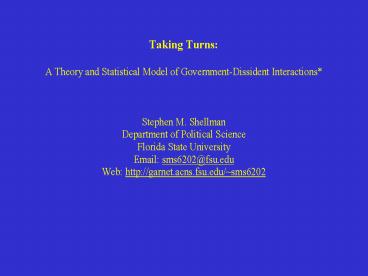Questions - PowerPoint PPT Presentation
Questions
Israel 1979-2002 (KEDS) Afghanistan 1990-1999 (KEDS Central Asia) ... Political Interactions (IPI), and the Kansas Event Data Systems (KEDS) ... – PowerPoint PPT presentation
Title: Questions
1
(No Transcript)
2
Questions
- Literature has contradictory findings on
repression. Some argue repression decreases
dissident activity, others argue that repression
increases rebellion - What are the effects of government activity on
dissident movements? - How does dissident activity affect government
response to dissident groups?
3
Purpose
- Seek to explain combinations of various empirical
findings using single theoretical framework - Examine the strategic behavior between
governments and dissident groups. - Identify conditions under which two parties
respond to each other both cooperatively and
violently in a single theoretical framework.
4
Government and Dissident Action Set
5
Action costs, Opponent Costs, and Budget
- Both government and dissidents are subject to
costs for taking action and costs imposed by
their respective opponent. - Both sides have finite amount of budget to pay
the costs of action and absorb the costs imposed
by their respective opponent.
6
Constraints on Budget
- Internal Constraints The ability of both the
government and the dissidents to act is
constrained by forces internal to these
organizations. - External Constraints By taking action against
each other, both the government and the
dissidents constrain each others ability to take
action.
7
Government and Dissident Action Set
8
General Hypothesis 1 2
9
Context Hypotheses
10
Predicting Government and Dissident Behavior
11
Research Design Cases
- Venezuela 1987-1992 (IPI)
- Chile 1983-1992 (IPI)
- Israel 1979-2002 (KEDS)
- Afghanistan 1990-1999 (KEDS Central Asia)
- Cambodia 1975-2000 (TABARI currently collecting
the data with NSF funds)
12
Case Aggregation
Observation of Events
Theoretical Specification Sequences
13
Data and Method
- Intranational Political Interactions (IPI), and
the Kansas Event Data Systems (KEDS). Event data
are "day-by-day coded accounts of who did what to
whom as reported in the open press," and
according to Goldstein (1992, 369). - For models with autocorrelated disturbances,
estimate ARIMA models. For models without
evidence of autocorrelated disturbances, OLS
estimates are used.
14
Results from Afghanistan
15
Conclusion
- Evidence suggests strategic aspect to government
and rebel decision-making - Future development of the project could move to
questions of how to translate the current model
into a game theoretic model - Other potential directions may include complex
system modeling.
PowerShow.com is a leading presentation sharing website. It has millions of presentations already uploaded and available with 1,000s more being uploaded by its users every day. Whatever your area of interest, here you’ll be able to find and view presentations you’ll love and possibly download. And, best of all, it is completely free and easy to use.
You might even have a presentation you’d like to share with others. If so, just upload it to PowerShow.com. We’ll convert it to an HTML5 slideshow that includes all the media types you’ve already added: audio, video, music, pictures, animations and transition effects. Then you can share it with your target audience as well as PowerShow.com’s millions of monthly visitors. And, again, it’s all free.
About the Developers
PowerShow.com is brought to you by CrystalGraphics, the award-winning developer and market-leading publisher of rich-media enhancement products for presentations. Our product offerings include millions of PowerPoint templates, diagrams, animated 3D characters and more.































